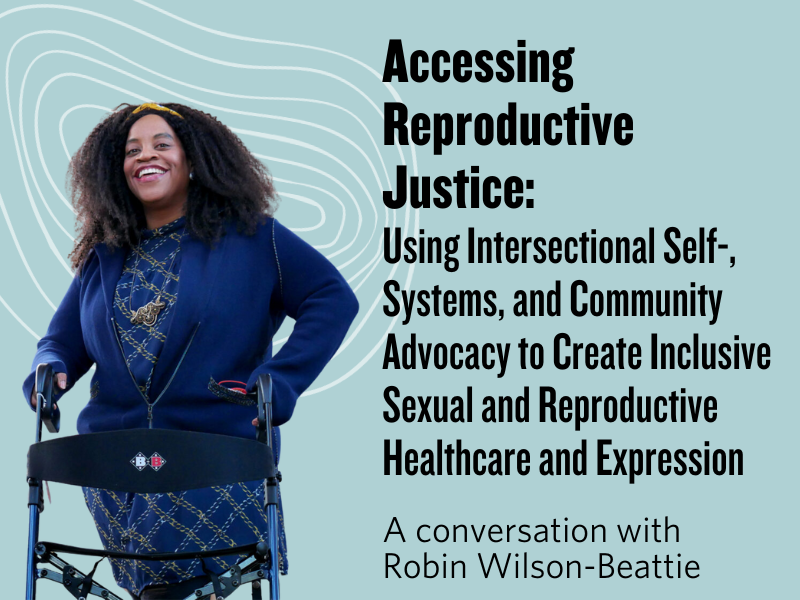Disability Day of Mourning: A day to honor people with disabilities who were killed by their family members
March 2024
Disability Day of Mourning: A day to honor people with disabilities who were killed by their family members
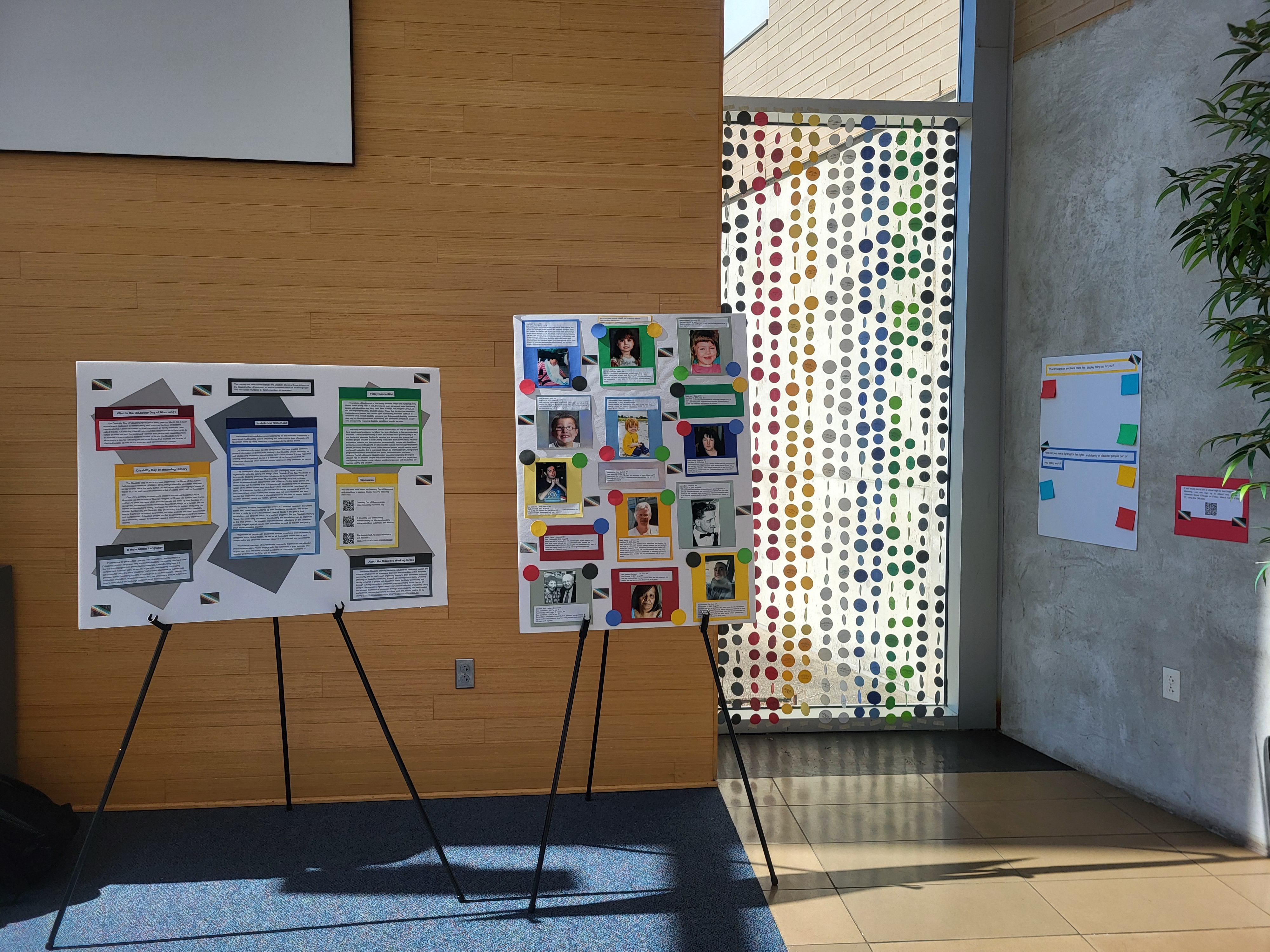
Intro
This display has been constructed by the Disability Working Group in honor of the Disability Day of Mourning, an annual commemoration of disabled people who have been murdered by family members or caregivers.
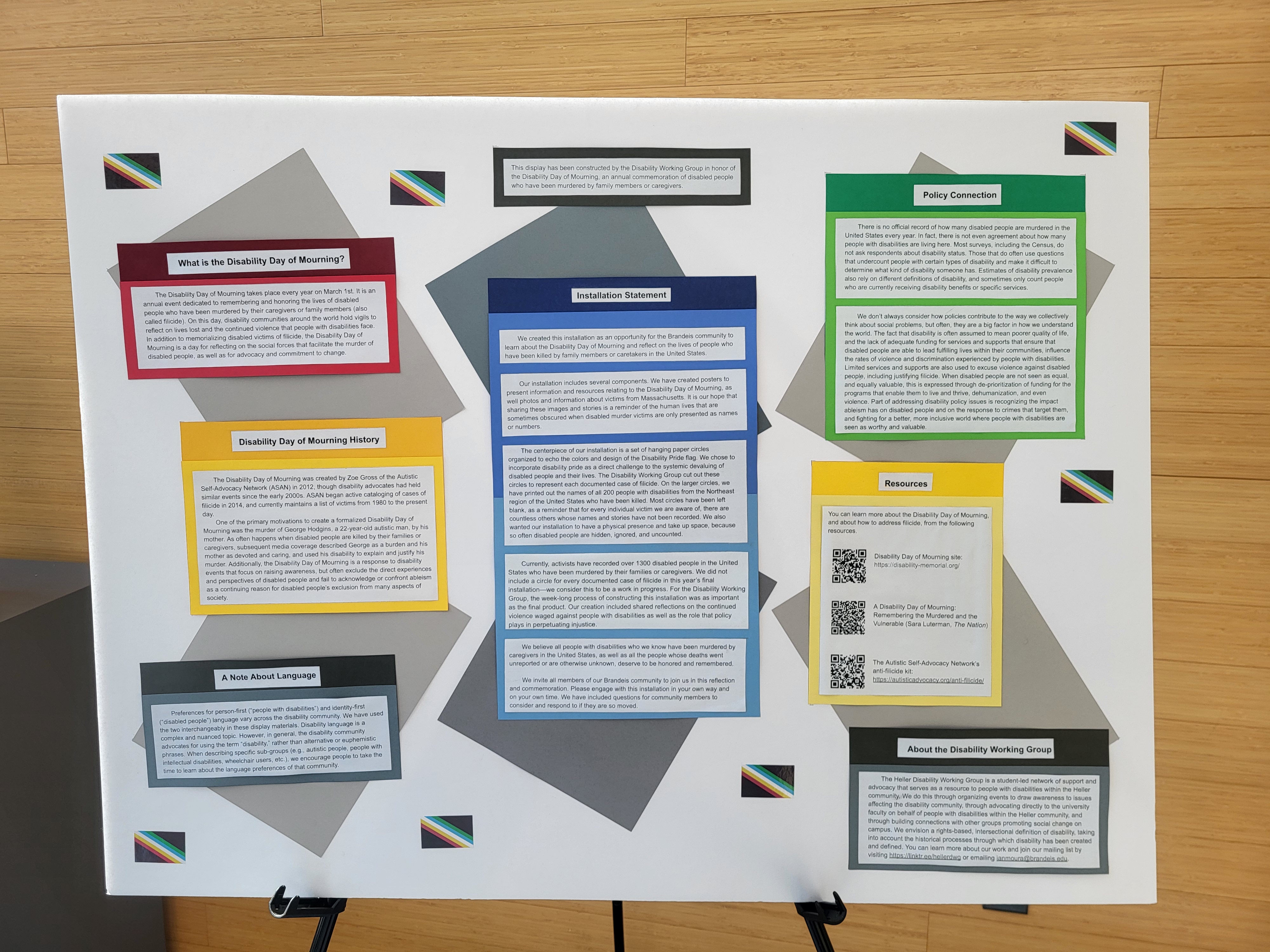
What is the Disability Day of Mourning?
The Disability Day of Mourning takes place every year on March 1st. It is an annual event dedicated to remembering and honoring the lives of disabled people who have been murdered by their caregivers or family members (also called filicide). On this day, disability communities around the world hold vigils to reflect on lives lost and the continued violence that people with disabilities face. In addition to memorializing disabled victims of filicide, the Disability Day of Mourning is a day for reflecting on the social forces that facilitate the murder of disabled people, as well as for advocacy and commitment to change.
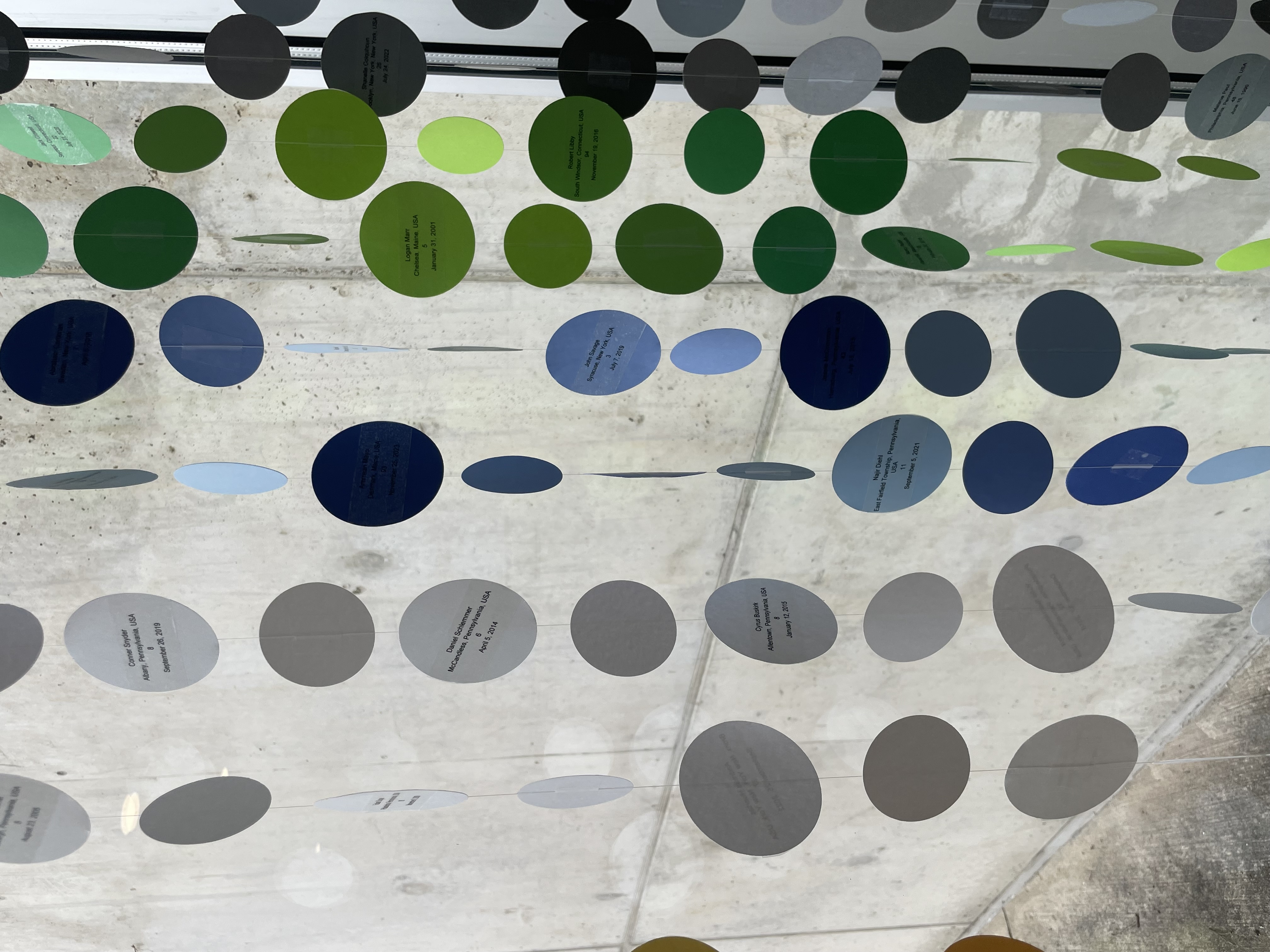
Disability Day of Mourning History
The Disability Day of Mourning was created by Zoe Gross of the Autistic Self-Advocacy Network (ASAN) in 2012, though disability advocates had held similar events since the early 2000s. ASAN began active cataloging of cases of filicide in 2014, and currently maintains a list of victims from 1980 to the present day.
One of the primary motivations to create a formalized Disability Day of Mourning was the murder of George Hodgins, a 22-year-old autistic man, by his mother. As often happens when disabled people are killed by their families or caregivers, subsequent media coverage described George as a burden and his mother as devoted and caring, and used his disability to explain and justify his murder. Additionally, the Disability Day of Mourning is a response to disability events that focus on raising awareness, but often exclude the direct experiences and perspectives of disabled people and fail to acknowledge or confront ableism as a continuing reason for disabled people’s exclusion from many aspects of society.
A Note About Language
Preferences for person-first (“people with disabilities”) and identity-first (“disabled people”) language vary across the disability community. We have used the two interchangeably in these display materials. Disability language is a complex and nuanced topic. However, in general, the disability community advocates for using the term “disability,” rather than alternative or euphemistic phrases. When describing specific sub-groups (e.g., autistic people, people with intellectual disabilities, wheelchair users, etc.), we encourage people to take the time to learn about the language preferences of that community.
Installation Statement
We created this installation as an opportunity for the Brandeis community to learn about the Disability Day of Mourning and reflect on the lives of people who have been killed by family members or caretakers in the United States.
Our installation includes several components. We have created posters to present information and resources relating to the Disability Day of Mourning, as well photos and information about victims from Massachusetts. It is our hope that sharing these images and stories is a reminder of the human lives that are sometimes obscured when disabled murder victims are only presented as names or numbers.
The centerpiece of our installation is a set of hanging paper circles organized to echo the colors and design of the Disability Pride flag. We chose to incorporate disability pride as a direct challenge to the systemic devaluing of disabled people and their lives. The Disability Working Group cut out these circles to represent each documented case of filicide. On the larger circles, we have printed out the names of all 200 people with disabilities from the Northeast region of the United States who have been killed. Most circles have been left blank, as a reminder that for every individual victim we are aware of, there are countless others whose names and stories have not been recorded. We also wanted our installation to have a physical presence and take up space, because so often disabled people are hidden, ignored, and uncounted.
Currently, activists have recorded over 1300 disabled people in the United States who have been murdered by their families or caregivers. We did not include a circle for every documented case of filicide in this year’s final installation—we consider this to be a work in progress. For the Disability Working Group, the week-long process of constructing this installation was as important as the final product. Our creation included shared reflections on the continued violence waged against people with disabilities as well as the role that policy plays in perpetuating injustice.
We believe all people with disabilities who we know have been murdered by caregivers in the United States, as well as all the people whose deaths went unreported or are otherwise unknown, deserve to be honored and remembered.
We invite all members of our Brandeis community to join us in this reflection and commemoration. Please engage with this installation in your own way and on your own time. We have included questions for community members to consider and respond to if they are so moved.Policy Connection
There is no official record of how many disabled people are murdered in the United States every year. In fact, there is not even agreement about how many people with disabilities are living here. Most surveys, including the Census, do not ask respondents about disability status. Those that do often use questions that undercount people with certain types of disability and make it difficult to determine what kind of disability someone has. Estimates of disability prevalence also rely on different definitions of disability, and sometimes only count people who are currently receiving disability benefits or specific services.
We don’t always consider how policies contribute to the way we collectively think about social problems, but often, they are a big factor in how we understand the world. The fact that disability is often assumed to mean poorer quality of life, and the lack of adequate funding for services and supports that ensure that disabled people are able to lead fulfilling lives within their communities, influence the rates of violence and discrimination experienced by people with disabilities. Limited services and supports are also used to excuse violence against disabled people, including justifying filicide. When disabled people are not seen as equal, and equally valuable, this is expressed through de-prioritization of funding for the programs that enable them to live and thrive, dehumanization, and even violence. Part of addressing disability policy issues is recognizing the impact ableism has on disabled people and on the response to crimes that target them, and fighting for a better, more inclusive world where people with disabilities are seen as worthy and valuable.
Resources
You can learn more about the Disability Day of Mourning, and about how to address filicide, from the following resources.
Disability Day of Mourning site: https://disability-memorial.org/
A Disability Day of Mourning: Remembering the Murdered and the Vulnerable (Sara Luterman, The Nation)
The Autistic Self-Advocacy Network’s anti-filicide kit:
https://autisticadvocacy.org/anti-filicide/
About the Disability Working Group
The Heller Disability Working Group is a student-led network of support and advocacy that serves as a resource to people with disabilities within the Heller community. We do this through organizing events to draw awareness to issues affecting the disability community, through advocating directly to the university faculty on behalf of people with disabilities within the Heller community, and through building connections with other groups promoting social change on campus. We envision a rights-based, intersectional definition of disability, taking into account the historical processes through which disability has been created and defined. You can learn more about our work and join our mailing list by visiting https://linktr.ee/hellerdwg or emailing ianmoura@brandeis.edu.
Bios for victims from Massachusetts:
Information taken from the Disability Day of Mourning website: https://disability-memorial.org/
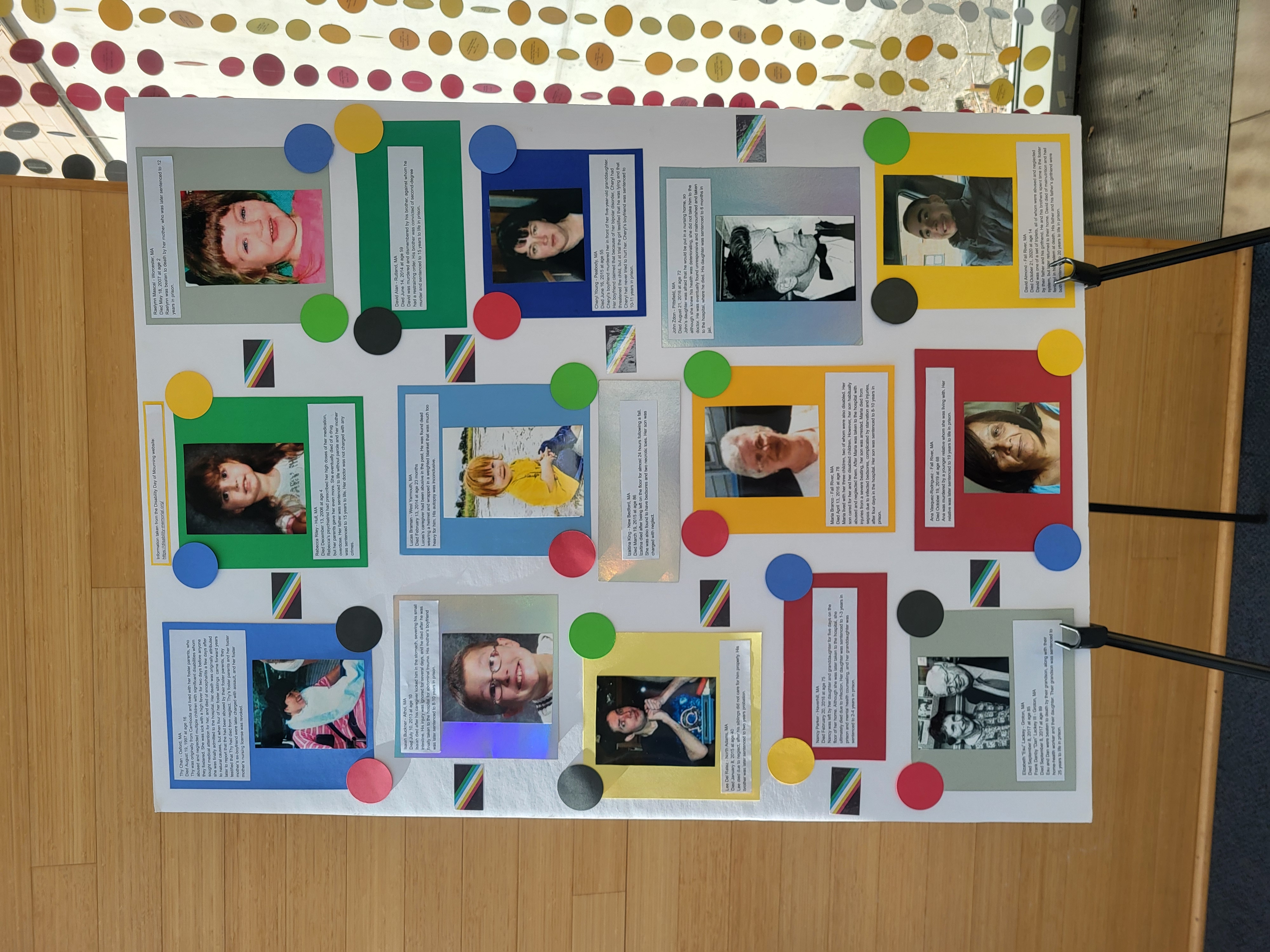
Nancy Parker - Haverhill, MA
Died February 20, 2016 at age 75
Nancy was left by her daughter and granddaughter for five days on the floor of her home. Although she was later taken to the hospital, she ultimately died due to infection. Her daughter was sentenced to 1-3 years in prison and mental health counseling, and her granddaughter was sentenced to 2-4 years in prison.
Izaltina King - New Bedford, MA
Died March 19, 2015 at age 86
Izaltina died after being left on the floor for almost 24 hours following a fall. She was also found to have bedsores and two necrotic toes. Her son was charged with neglect.
David Alan - Rutland, MA
Died June 14, 2014 at age 59
David was murdered and dismembered by his brother, against whom he had a restraining order. His brother was convicted of second-degree murder and sentenced to 15 years to life in prison.
Thy Chan - Oxford, MA
Died August 19, 1997 at age 16
Thy was originally from Cambodia and lived with her foster parents, who abused and neglected multiple children with significant disabilities whom they fostered. She was sick with a high fever for two days before anyone sought medical attention for her, and died of encephalitis a few days after she was finally admitted to the hospital. Her death was originally attributed to natural causes, but when four of her foster siblings came forward years later to report that the had been abused by their foster parents, they testified that Thy had died from neglect. Thy’s foster parents and her foster mother’s ex-boyfriend were later charged with assault, and her foster mother’s nursing license was revoked.
Rebecca Riley - Hull, MA
Died December 13, 2006 at age 4
Rebecca’s psychiatrist had prescribed her high doses of her medication, but her parents gave her even more. She eventually died of a drug overdose. Her father was sentenced to life without parole and her mother was sentenced to 15 years to life. Her doctor was not charged with any crimes.
Raelynn Mascal - Worcester, MA
Died May 18, 2007 at age 2
Raelynn was beaten to death by her mother, who was later sentenced to 12 years in prison.
Isaiah Buckner - Athol, MA
Died July 10, 2013 at age 10
Isaiah died after his caregiver kicked him in the stomach, severing his small intestine. His injury was ignored for several days, and he died after he was finally taken to the hospital for abdominal trauma. His mother’s boyfriend was later sentenced to 8-10 years in prison.
Lucas Braman - West Yarmouth, MA
Died February 13, 2014 at age 23 months
Lucas’s caregiver had been abusive in the past. He was found dead wearing a helmet and wrapped in a weighted blanket that was much too heavy for him. His autopsy was inconclusive.
Lee Del Ratez - North Adams, MA
Died January 8, 2015 at age 40
Lee died due to neglect, after his siblings did not care for him properly. His brother was later sentenced to two years probation.
Cheryl Young - Peabody, MA
Died June 16, 2015 at age 55
Cheryl’s boyfriend murdered her in front of her five-year-old granddaughter. Her boyfriend claimed that because of her bipolar disorder, Cheryl had threatened the child, but at trial the girl testified that he was lying and that Cheryl had never tried to hurt her. Cheryl’s boyfriend was sentenced to 10-11 years in prison.
Maria Branco - Fall River, MA
Died April 13, 2016 at age 78
Maria lived with her three children, two of whom were also disabled. Her son cared for her and her disabled children. However, her son habitually abused and neglected them. After Maria was taken to the hospital with injuries from a severe beating, her son was arrested. Maria died from sepsis due to infected bedsores, complicated by starvation and injuries, after four days in the hospital. Her son was sentenced to 8-10 years in prison.
John Zdon - Pittsfield, MA
Died August 21, 2016 at age 72
John’s daughter was afraid that he would be put in a nursing home, so although she knew his health was deteriorating, she did not take him to the doctor. He was eventually found unresponsive and malnourished and taken to the hospital, where he died. His daughter was sentenced to 6 months in jail.
Elizabeth “Esu” Lackey - Groton, MA
Died September 8, 2017 at age 85
Frank Danby “Dan” Lackey III - Groton, MA
Died September 8, 2017 at age 89
Esu and Dan were beaten to death by their grandson, along with their home-health worker and their daughter. Their grandson was sentenced to 25 years to life in prison.
Ana Vasquez-Rodriguez - Fall River, MA
Died October 19, 2019 at age 68
Ana was murdered by a younger relative whom she was living with. Her relative was later sentenced to 19 years to life in prison.
David Almond - Fall River, MA
Died October 21, 2020 at age 14
David was one of a set of triplets, all of whom were abused and neglected by their father and his girlfriend. He and his brothers spent time in the foster system, but later returned to their home. David died of malnutrition and had fentanyl in his system at death. His father and his father’s girlfriend were both sentenced to 20 years to life in prison.
Link to join UIC virtual vigil
If you would like to join a virtual vigil for the Disability Day of Mourning, you can sign up to attend one hosted by University Illinois Chicago on Friday, March 1st at 6:30pm ET, using this QR code.
Announcing Robin Wilson-Beattie as the Carrie Buck Distinguished Fellow for 2024
January 2024
Carrie Buck Distinguished Fellowship 2024: Robin Wilson-Beattie
A conversation with Carrie Buck Distinguished Fellow Robin Wilson-Beattie and Rebecca Cokley will take place on March 7, 2024 at 5 p.m. ET. In-person and online.
Robin's groundbreaking insights into the intersection of disability, sexuality, healthcare, design, and identity have revolutionized sexual-health education.





